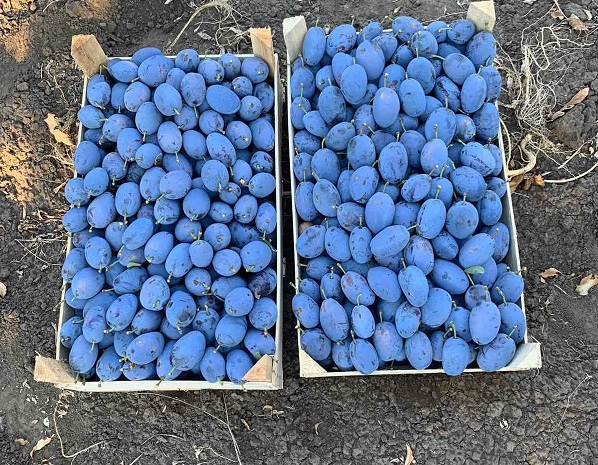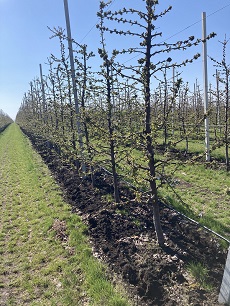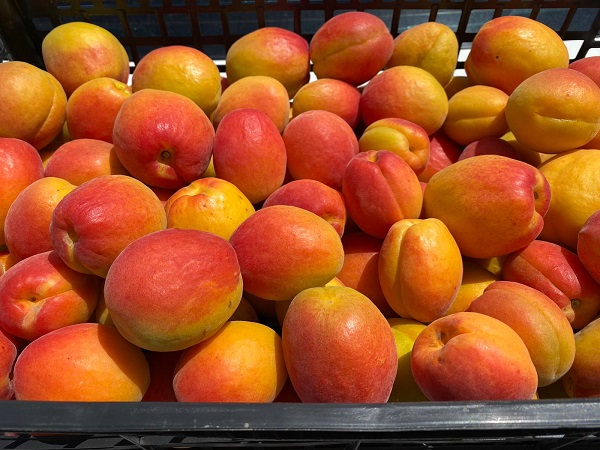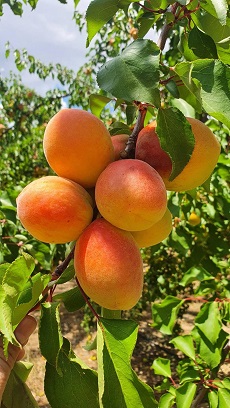“It provides us with opportunities,” say Peter Smets and René Kraaijeveld of Smets Food Trading in the Netherlands. They’re referring to importing stone fruit from the Balkans. “Production costs are lower there, and everything’s new. That includes the planting, but also the sorting and packing facilities. It’s nice working there. We think it will keep expanding.”

New cherry and apricot varieties, in particular, have been planted. That makes for better sizes, but above all, for good flavor, says Peter. “In countries like Spain and Italy, you have to grow as much as possible per square meter to be profitable. In the Balkans, the land costs less, so cultivation is a bit more natural, which benefits the taste.” The transportation costs for imports from the Balkans aren’t even as high as getting stone fruit from similar southern European import areas. It’s even slightly more favorable.
Guidance Smets Food Trading has been importing peaches, nectarines, apricots, cherries, plums, and watermelons for six years already. These come from Serbia, Macedonia, Albania, Moldova, and Greece. In the past, these countries focused their sales on Russia. But the risks there are increasing, so they’re shifting this attention to Europe. Peter and René say the Balkan countries still have little experience in exporting to Europe.
Smets Food Trading has been importing peaches, nectarines, apricots, cherries, plums, and watermelons for six years already. These come from Serbia, Macedonia, Albania, Moldova, and Greece. In the past, these countries focused their sales on Russia. But the risks there are increasing, so they’re shifting this attention to Europe. Peter and René say the Balkan countries still have little experience in exporting to Europe.
That brings challenges and makes it essential to guide and supervise exports. “Our biggest challenge concerns sorting and packing. In the beginning, we bought from traders. Now, we’re increasingly focusing on growers. Then we can control the whole chain. We also organize transportation,” says René. MRLs and cultivation-wise, he sees few risks. That’s because many of the Balkan stone fruit producers they work with are GlobalGAP certified.

Cold weather
The stone fruit supply from the Balkan region gradually began at the end of May. That was with Greek cherries. “It’s been cold there too,” says René. “We were a good ten days behind.” There should be 30% fewer peaches and nectarines due to the overnight frosts. The cold weather in the Netherlands was also slowing demand down.
 René thinks the lower peach, nectarine, and apricot crops forecasts will hamper organizing sufficient supply as the season progresses. This will also likely to affect prices. “I think these products are generally going to be slightly more expensive than last year.” The weather hasn’t affected other types of stone fruit as much. “Plums and cherries are plentiful, but the latter may be a bit small,” he adds.
René thinks the lower peach, nectarine, and apricot crops forecasts will hamper organizing sufficient supply as the season progresses. This will also likely to affect prices. “I think these products are generally going to be slightly more expensive than last year.” The weather hasn’t affected other types of stone fruit as much. “Plums and cherries are plentiful, but the latter may be a bit small,” he adds.
Smets Food Trading sells this imported stone fruit mainly to Dutch companies. A small part finds its way to Germany, Belgium, and France. That’s also where their focus lies. “We’re more of an importer than exporter,” says Peter. Part of their very inclusive fruit range is sold under the company’s Sappy brand. “We now sell apples under this name. But we want to expand it with other products,” concludes René.
René Kraaijeveld
rene@smetsfoodtrading.com
Peter Smets
peter@smetsfoodtrading.com
Smets Food Trading
+31 (0)46 2060 200
commerce@smetsfoodtrading.com
www.smetsfoodtrading.com


